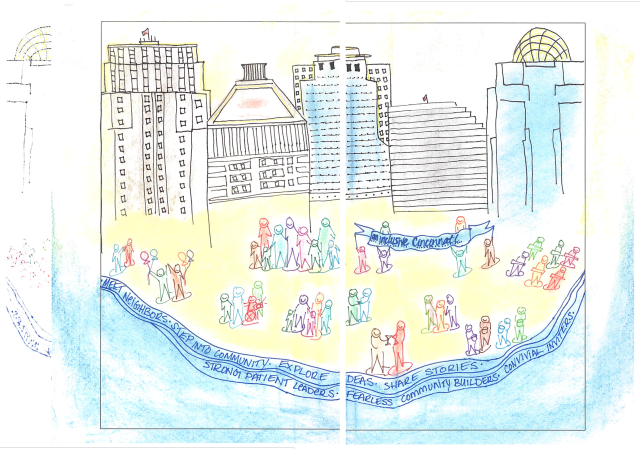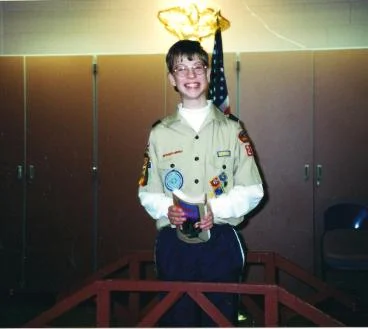“The beginning of love is to let those we love be perfectly themselves, and not to twist them to fit our own image. Otherwise we love only the reflection of ourselves we find in them.” — Thomas Merton
We’ve received a few comments about 51 People, and Introversion is not Isolation on the blog and via Facebook about how many people without disabilities have a lonely life as well. It got me to think about the people in my life and loneliness and how it affects all of us at some point, if we’re honest. (I still think that the level of isolation is much more profound for people with disabilities, a much deeper divide than people without disabilities, but this isn’t a post to refute who is lonelier.)
I recently had the honor of witnessing a beautiful wedding for two of my best friends, Amy and Collin on Saturday and I’m feeling reflective, sentimental. There are times when life and love is beautiful with love that is bountiful, evident, and publicly proclaimed in front of family and friends like on Saturday, and then there are times in those difficult and quiet moments where loneliness and darkness creep in, and being loved doesn’t seem so evident.
This dives deeper into the personal than the work we often talk about here, but it’s all relative. I’ve not changed names here because the story is important, and I’ve tried my best to do so in a respectful way. The only way I could do that in a respectful is in a letter format.
Our board member, Neal, wrote in his blog post, – “I’ve been very lucky in my life to have friends like you that make being alive a great experience. Sure, I gripe and groan about the problems I experience but I’m human. The reality is that with good friends and a supportive wife and family, things work out. Life ends up pretty good.”
I guess this is a post about how people know you, carry your story, and how your presence, or lack of physical presence in this case, continues to make an impact. How friends make “being alive a great experience.” And what happens when you’re no longer alive to those who loved you.
Do you ever wonder how you’ll be known? What will people think in their heads about you after you’ve gone? What will they write, months later to public blogs like this? What sense will others make of your life without your permission?
___________________________
Dear Phil,
It’s probably a weird, morbid thing that Katie’s voicemail is still on my phone. And also weird that when my iphone was restored back to factory settings a few months ago due to a computer glitch, that I was not as worried about the camera phone pictures of the dogs or Jordan or of the house, the lost calendar for work, or the hundreds of lost contacts, but it was more the realization that perhaps the texts from you would be gone, too.
Gone as inexplicably as you. There one minute and then just not the next. A funny thing happened, though. The pictures, and contacts and calendar and even the texts all came back after a day or so, miraculously. The same cannot be said about you. You have not returned.
That was your way, wasn’t it? Taking off to Texas once, winding up in 20-20 another time, as gone and here as often as you’d like. A phantom at the table one day and then just not the next. You had the habit of disappearing for a couple of days, or months, years sometimes, and then resurface better than you’d left us, as if perhaps you were just specter caught out of the side of our eyes.
It’s taken me awhile to realize that this isn’t just another time that you’ve taken off. And Jordan was right to tell me it was unhealthy to cope that way. But it’s difficult not to when I know the last text you sent me was “I’ll hit you up when I get back in town again.” I’ve had to stop myself from hoping you’ll be at a tavern somewhere again maybe 3 years down the road, and we’ll catch up like we did before, and perhaps I’ve just been looking in all the wrong places, looking in the wrong town for you.
Katie asked me to speak at your funeral. And I did. She also asked for photos and I couldn’t find any of the ones I was looking for, but I did find a book you gave me on my 18th birthday. The Perks of Being a Wallflower. They made a movie based on it recently, maybe you saw it before you died?, but I haven’t seen it yet. I pretty much wrote your eulogy about what you wrote to me inside the book cover. It was weird then, and is still now, to use past tense when talking about you. But it went like this:
“Phil’s sense of humor was impeccable, dry, and ironic. I apologize, but it was often inappropriate but perfectly timed. Inside the book he wrote in bright green sharpie on the top of the page ‘You’re 18! You can now buy porn!’ In pen he wrote of our friendship—starting off rocky and developing into something he admired and was grateful for. He wrote about not being good at these emotional and sentimental things, something we both had in common and struggled with, but wrote ‘Jones, these are the days I’ll look back on and smile. Much peace and love always.’” I changed my name since you died, but I kept the Jones. You still owe us our wedding video.
I remember you stayed with me once when we were 17, maybe for a couple days; maybe it was just one night. I don’t remember now. Up in the attic bedroom on 31st you slept in Jenny’s bed, and I slept in mine, while Jenny slept on the couch as a child, making room for you, a much older child. It was good to wake up and know you weren’t gone again. We never talked about what that was about. Why home wasn’t where you wanted to be. Why fleeing to Texas in your red car, getting locked up in juvie, and sleeping in other people’s beds were better than your own.
For so long I’ve carried the story that it wasn’t my place to ask. That our story was one of nondisclosure. But not of nondisclosure to each other, but to ourselves. It was none of my business; laughter, jokes, and ignoring whatever was going on what was exactly we needed from each other. I guess in hindsight, we were probably wrong about that.
There are a lot of things we could have done differently. I texted you twice since you died. Once, about a week or two after, I had too much to drink and got emotional. That message sent through to your number and I can only wonder who has your phone and read it. The other, at Christmas to tell you happy birthday. That one came back as “message undeliverable.”
The old crew went out for drinks after your funeral. We hadn’t all been together since high school. We joked about old stuff, I bought pizza, we drank bourbon and then we all went home. We will never do it again, though. I know that. There was a sadness to the passage of time, knowing at one point, we all loved each other and that wasn’t true anymore.
There was more to the eulogy, Phil, and others spoke, too. The point I tried to get across was that I was happy to have had the honor of loving someone as ridiculous, giving, creative, and beautiful as you, even for a short time. You were loved. I remember your mom whispering in mine and Jordan’s ear at the end of your ceremony “he loved you two so much. So much.”
In a few months we’re coming up on a year. I don’t know if you were lonely that night or bored. I don’t know if it was sadness or fear, or isolation. Maybe none of those things at all. I don’t know because we never talked about such things. I said I couldn’t hang out because of the ½ marathon. I had to run 12 miles at 8 AM and had already slacked off on training. We’d catch up another time. I probably would have done that part differently, too.
Your words in that old book have helped. Much peace and love always. The Thomas Merton quote helps, too. That I let you be perfectly yourself, and didn’t try to twist your image, and you did the honor of doing the same for me. That loving someone just means, letting them be perfectly themselves. Much peace and love always.
Love,
Jones
_______________________________________________
It’s interesting that the five valued experiences don’t include “being loved.” I’m sure love falls into the category of growing in relationships, but I’ve been in many where love isn’t present. It could also be included in experiencing respect, but I tend to agree with Kathy Forte that you can respect someone and not love them. Sharing ordinary places doesn’t seem to fit, and neither does making contributions or making choices. I think there’s an absence of love even though I guess all of them could be ways to find love, make others love you, or the means by which you could grow in love. But being loved is much different. It’s the reason letters like this one get written, months after death, on a random Monday night that has no real significance.
I’m reminded of an obituary I read of a person who died the same night Phil. It was about a person with a disability. I know this, because there was a picture of her and because it said “for over 20 years she was a valued employee of Jackson and Kidd DDS Centers.” I’m not upset by what was written about her. It was respectful, and I didn’t know this woman and can’t say if there was more to her story or not. Her life was defined by 20 years at an adult center. But it doesn’t tell us anything that sets her apart from the hundreds of other adults with disabilities that have worked there too, and their stories likely read the same.
It said she was “beloved” and had many nieces and nephews. I’d like to hear more of that story, the story of being beloved. I hope that somewhere, a friend is writing her a letter, remembering her on this random Monday, too.
“Monday Night” overlooking Oaklawn 1/14/13
Being loved is probably the most valued experience. It is one in which we all want. We spend our lives looking for connections to others, planning for babies, and weddings, and funerals. Gathering our people, collecting them like rare coins or trading cards, searching for deep connectedness. Some people add value to our collection, a rare find!, one of a kind!, priceless!, while other people move on to the next collector, and the next, and the next.
Who are the people in our lives that hold our story? Amy and Collin will hold and carry each others’, and part of mine, and part of Jordan’s, and parts of all our friends’s story. What of the woman who died the same night as my friend? Who holds her story? Who holds yours?
Certainly for Phil, I carry his. And being loved, I’ve learned, is the most valued experience.








































